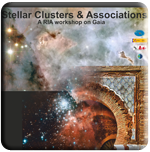VLT-MAD observations of the core of 30 Doradus
Campbell, M. A.; Evans, C. J.; Mackey, A. D.; Gieles, M.; Alves, J.; Ascenso, J.; Bastian, N.; Longmore, A. J.
Monthly Notices of the Royal Astronomical Society, Volume 405, Issue 1, pp. 421-435.
06/2010
ABSTRACT
We present H- and Ks-band imaging of three fields at the centre of 30 Doradus (30 Dor) in the Large Magellanic Cloud, obtained as part of the Science Demonstration programme with the Multiconjugate Adaptive optics Demonstrator (MAD) at the Very Large Telescope. Strehl ratios of 15-30 per cent were achieved in the Ks band, yielding near-infrared images of this dense and complex region at unprecedented angular resolution at these wavelengths.
The MAD data are used to construct a near-infrared luminosity profile for R136, the cluster at the core of 30 Dor. Using cluster profiles of the form used by Elson et al., we find the surface brightness can be fit by a relatively shallow power-law function (γ ~ 1.5-1.7) over the full extent of the MAD data, which extends to a radius of ~40arcsec (~10pc). We do not see compelling evidence for a break in the luminosity profile as seen in optical data in the literature, arguing that cluster asymmetries are the dominant source, although extinction effects and stars from nearby triggered star formation likely also contribute. These results highlight the need to consider cluster asymmetries and multiple spatial components in interpretation of the luminosity profiles of distant unresolved clusters.
We also investigate seven candidate young stellar objects reported by Gruendl & Chu from Spitzer observations, six of which have apparent counterparts in the MAD images. The most interesting of these (053839.24-690552.3) appears related to a striking bow-shock-like feature, orientated away from both R136 and the Wolf-Rayet star Brey 75, at distances of 19.5 and 8arcsec (4.7 and 1.9pc in projection), respectively.


